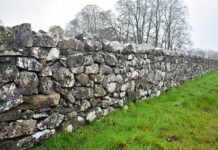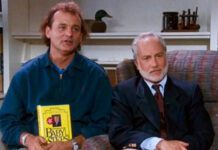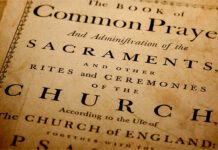[The following is an excerpt from Chapter 2 of Lucky: How the Kingdom Comes to Unlikely People.]
Before the beginning, God. God, the Three in One, who sees the end from the beginning. God, who decided before the foundations of the world that Christ the Son would be the Lamb of God, slain for the sin of the world.
God was not caught off guard by Adam’s sin. He knew His first image-bearers would taint His image in them by their own rebellion. He knew the people He chose to be His luck-bearers would instead become self-absorbed and syncretistic. He knew they would become a curse, a byword among the nations instead of a blessing to all peoples. He knew their eventual exile out of the Promised Land, like Adam and Eve’s expulsion from Eden, would only underscore the plight of all creation: a luckless world waiting for redemption, a redemption that could only come from beyond itself.
And so He came.
Christ entered into the luckless, joyless, lifeless world. He was born to the unlikeliest of people: a Jewish carpenter and his ordinary wife. Yet even His arrival in her womb elevated her. Because of Him, she, the scandal of her town, the subject of scornful whispers and smirking eyes, was called by an angel “highly favored … among women” (Luke 1:28 NKJV). She was blessed. Though they did not know it yet, the luckless had become lucky.
At His birth, shepherds—rootless wandering rogues—were visited by a choral constellation of angels announcing good news. Like Abraham, the nomadic shepherd that God had visited thousands of years earlier; like Moses, the shepherd in Midian tending his fatherin- law’s flock, who saw a bush on fire yet not consumed; like David, the king God crowned while he was hidden in the valley tending his father’s sheep—shepherds are once again the lucky ones, the ones God visits. Something about them must remind Him of Himself. Dirty and stained, His image in them still shimmers in the light of His glorious eyes.
Jesus, from His conception and birth, began bringing blessing to the world. This was the fulfillment of what God had promised Abraham. God had promised to bring blessing to the world through Abraham’s family; now the promise was coming to pass specifically through Jesus the Messiah. Jesus is Abraham’s seed, the Chosen One, the One who would perfectly fulfill the call to reveal God to the world and to rescue and restore all created things. He is the perfect Image-Bearer, for He is the “image of the invisible God” (Col. 1:15).
Not only is Jesus the perfect Image-Bearer, He is also the ultimate Luck-Bearer. Through His life, death, and resurrection, humanity will be redeemed, and creation will be restored. Humanity had been wasting away since the first man, by his disobedience, brought death into the world. But now, through this “one man’s obedience,” life—unexpected, undeserved, abundant, overflowing Life, the Life of the age to come!—would come to all (Rom. 5:12-20 ESV).
Walking the shores of Galilee, the God who called Adam out of hiding began calling people out of their small, self-destructing lives. “Stop this attempt at autonomy. Stop trying to be better, do better, on your own. Stop casting your nets and toiling all night and hoping for different results. It is futile. You cannot live without Me. You were not made to. Come. Follow Me.”
As He healed the sick and drove out demons, He was signaling the arrival of His kingdom. It was an invasion. But not an invasion of a foreign army; rather it was the arrival of creation’s rightful King. His rule was undoing the infection of evil. With every miracle, He was announcing that the jig was up, the time had come. History was now turning on a hinge.
Isaiah’s vision of Messiah hundreds of years earlier was of one who, by His own wounds, would heal the fractures (Isa. 53): in Israel, the nation torn apart by idolatry and sin; in the world, which had fallen into a constant state of war; in humanity, which found itself irreparably distant from God. Messiah would lead to swords being beaten into plowshares and spears into pruning hooks; war would be retired forever. Beasts and humans would live in harmony (Isa. 2:4; 11:6-8). The prophets tell of a Messiah who would take this world, sick and broken and fractured and fallen, and make it whole, set it right.
In His death and resurrection, Jesus did just that. At the cross Jesus carried upon Himself every sin, every rebellion of the entire race of image-bearers. And in doing so, He redeemed not only them but the whole cosmos they had knocked out of kilter. By taking the full weight of sin—by “becoming sin,” becoming the curse—and then rising up from the grave, He defeated sin and reversed the curse of death. He set creation on a new trajectory, one that creation itself longs for (Rom. 8:19-25), one bound for renewal: a new heaven and a new earth (Rev. 21:1-5). As in the beginning, so in the end: God.
Because Jesus is the long-awaited fulfillment of the old promise, God, the “God of Abraham, Isaac, and Jacob,” is called, first by Paul and Peter, “God the Father of our Lord Jesus Christ.” Jesus, the Son of God, creation’s rightful King and the world’s true Lord, had broken the stain of the rebellion, ended the luckless night that had fallen upon Earth, and with His resurrection, awakened a new dawn, giving us hope for the fullness of Day that will come when He returns and all things will be made new and the cosmos set right.
This is why Jesus came. And He knew it.
So when Jesus climbed up the hill and opened His mouth to speak, He was making an announcement, the announcement His life itself proclaimed: “Good news! God has come … even to such as these! Luck has come to a luckless world. The kingdom of God has come to unlikely people.”
Buy LUCKY HERE.











